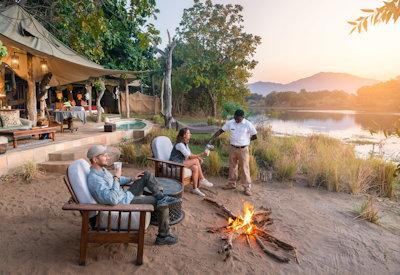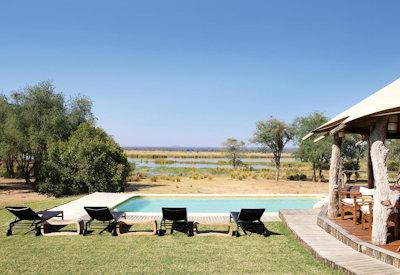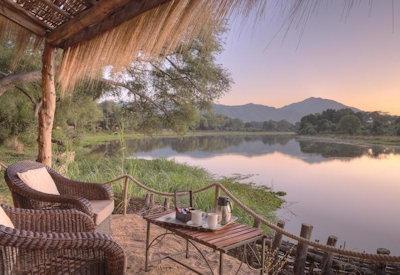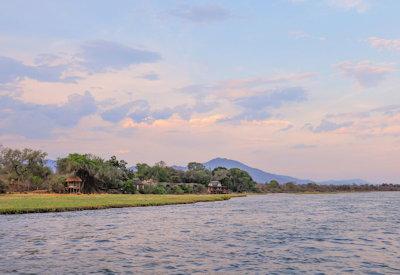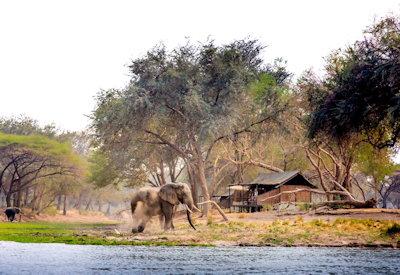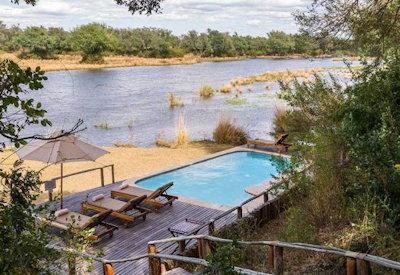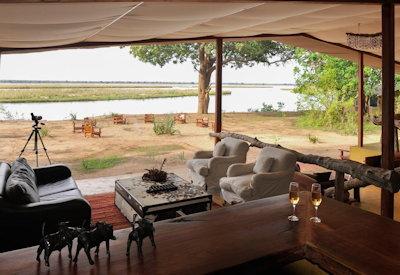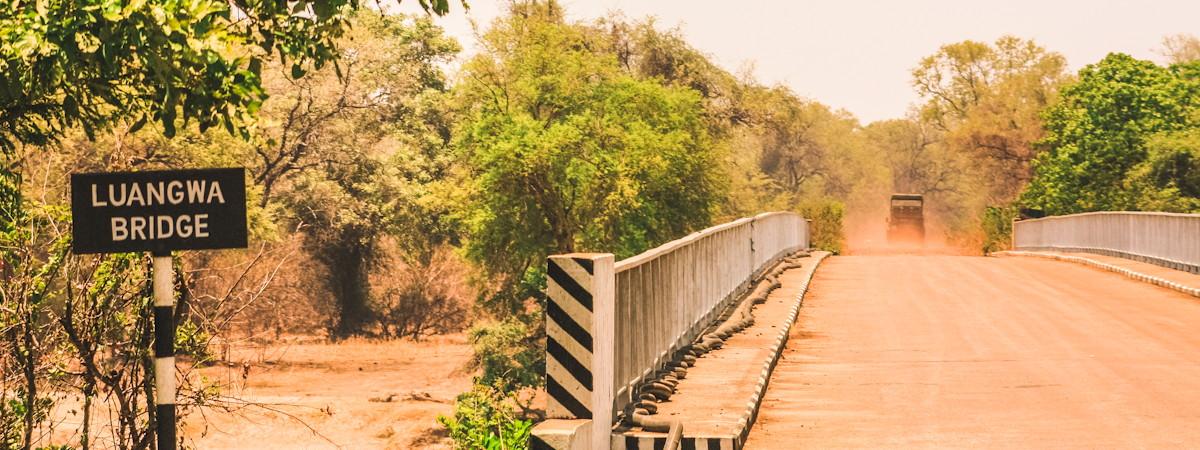
Experience the South Luangwa of Zambia, experience one of the best wildlife areas in the whole of Africa
Mchenja Camp
Meaning ebony - is one of the Norman Carr luxury bush camps (now Time+Tide), and is located on the banks of the Luangwa River in the most amazing setting beneath a grove of Ebony trees. The five thatch-roofed tents each have a deck overlooking the Luangwa River, as well as a gorgeous outside shower room, while inside you can relax in your bath while overlooking the River. There is a very refreshing small pool in the main thatched area, where you will also find the bar, where the guests flock to cool down after the morning's activities.
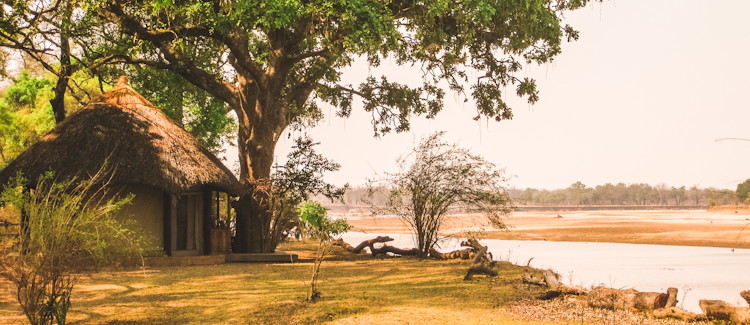
You can choose to view your wildlife on foot or from a safari vehicle; both day and night game drives are an option. Game viewing in this area is excellent. On our afternoon game drive, we were lucky enough to see the elusive leopard, as well as enjoy excellent sightings of hippo, elephant, bushbuck, and puku. We returned to camp at dark after enjoying our sundowners over the plain amongst the bushbuck and puku!
Mchenja Camp is the ideal place to do a walking safari from, particularly when combining it with the other Norman Carr camps (Time+Tide). From Mchenja it is a short morning walk - all walks are done first thing in the morning before it gets too warm.
Our morning call came at 5 am, giving us enough time to have some breakfast and get our energy levels up before our approx 2 hour bush walk to Kakuli. The bush walks are so different from what you would see and experience on a safari vehicle; you see things from a completely different perspective. Towards the end of our walk, we came across a buffalo carcass, right next to Kakuli Camp, which had vultures feeding off it. It was a very thrilling experience seeing the vultures swirling above and not knowing what we were going to stumble upon.
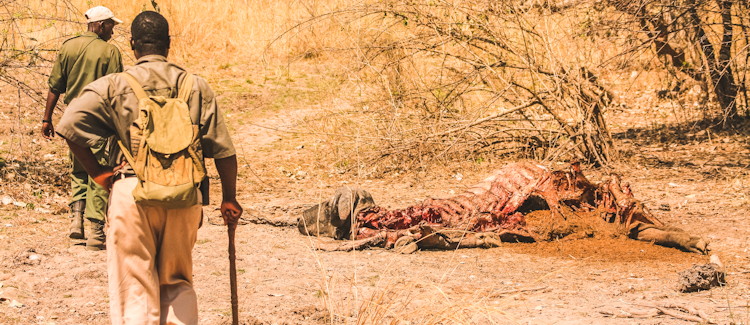
At Kakuli Camp we were met by the Mchenja vehicle for our transfer to Luwi Camp - we had had enough walking for one day!!
Luwi Bush Camp
Another Norman Carr camp (Time+Tide) - is a seasonal bush camp that gets completely rebuilt from scratch each season and is set under massive mahogany trees on the banks of a permanent lagoon.
As Luwi is set in such a remote location, with very few roads to traverse on, the activities are centred on walking. The wildlife in this area is in abundance which makes the bush walks very memorable.
There are only 4 huts which are all made of thatch and grass, and utilize the natural vegetation and surroundings wherever possible, offering a true rustic bush experience. All meals are served outside under the shade of the trees during the day, and under the starry African sky at night.
On the afternoon of our arrival - already quite exhausted from our morning activities (keeping in mind the temperatures in October average around 40 degrees centigrade) - we had a much-needed siesta, followed by our afternoon tea, before heading off for a short bushwalk around the camp. Luwi have a fantastic buffalo hide overlooking the lagoon, where we ended up after our walk. Bryony, the camp manager, and staff were waiting for us, all set up for our sundowners; Pimms, popcorn and lots of little yummy snacks!
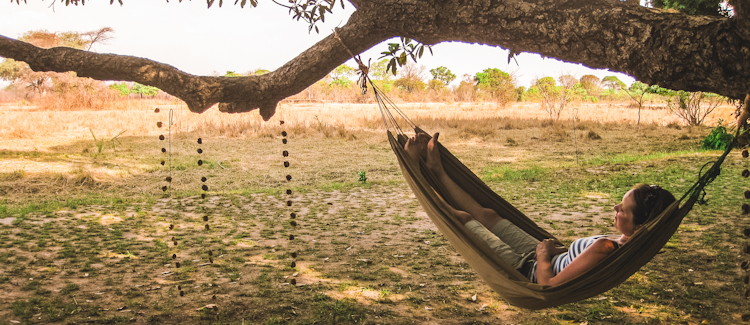
We then enjoyed a brief night game drive en-route back to the camp, where we saw hundreds of hippos and glowing croc eyes along the river banks.
A typical day at Luwi Bush Camp will start early, discussing the noises and animals heard through the night around the campfire area, whilst eating breakfast before you set off on your morning bush walk which on average takes between three and fours hours. In our case our next stop, also sadly our last, was on to Nsolo Bush Camp.
Luwi was one of my favourite camps; the setting is absolutely amazing and you really feel you are in the middle of nowhere. The only `downside' is there is no plunge pool, which we definitely could've done with.
Nsolo Camp
After our 5 am wake up and breakfast, we set off on foot for our 8km walk to Nsolo. It was exceptionally hot, even at 6 am! We walked at a fast but steady pace, stopping for a couple of Zebra, Bushbuck and Impala photo opportunities. About 30 minutes before the camp we stopped for a rest under some shady trees where we enjoyed some biscuits and tea. We made excellent time arriving at Nsolo just before 9 am, in time for a hearty brunch.
When travelling from Nsolo to Luwi, you pack your bags in the morning and set off on foot finishing at Nsolo. When you arrive you are welcomed with a refreshing cool drink, brunch on the table and your bags already waiting for you in your room.
The Norman Carr (Time+Tide) Nsolo Camp is situated on a bend in the Luwi Sands River, and I'm told is one of the more historic camps in Zambia. It was cited by Norman Carr in 1987 and Shaddy - who is the Camp Manager and Guide - has been studying the wildlife and conducting the walks from here for over 10 years now!
There are 4 thatched and very spacious chalets, with outdoor bathrooms, all raised on wooden decks with private verandahs, overlooking the dry riverbed in front of the camp. There is amazing game to be seen right from the comfort of your own deck.
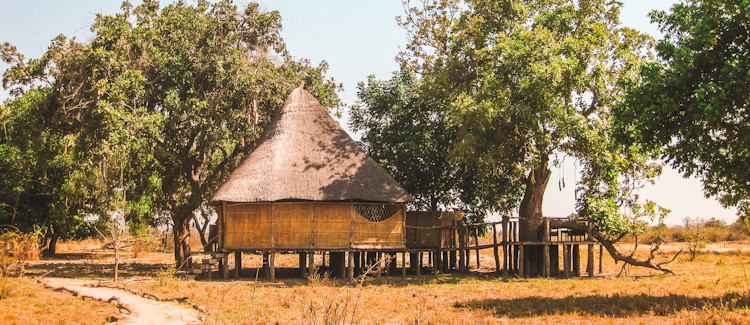
After enjoying our hearty brunch, we had a couple of hours to enjoy a siesta or just sit back and relax. With temperatures reaching into the early '40s (degrees centigrade) with a warm and humid wind, it was almost impossible to have a nap. We all gathered around the main area enjoying cool drink after cool drink until all of sudden a family of elephants entered the camp. They were literally about 10 metres away from us playing around in the overflow from the camp's water tank.
After our afternoon 'ellie' excitement we headed off for our last game drive, where we stopped and set off on a brief bushwalk to enjoy our last sunset.
The following morning we left just after 6 am. Although early it was just as well; we encountered a flat tyre soon into our drive back to Mfuwe, which set us back about 30 minutes!
The last stop before our departure was Tribal Textiles, which produces unique hand-painted traditional and contemporary fabrics in Zambia. Based on the edge of the South Luangwa National Park and established in 1991, Tribal Textiles currently has a team of over 150 local staff. The objective here is to promote fair trade, generate local employment and develop creative skills. Tribal Textiles also actively supports the local community school, Malimba, which currently has over 160 children.
We were fortunate enough to have enough time for a brief stop en-route to the airport and were given a tour of how things operated and were then let loose in the curio shop! If time permits in your itinerary, this is one project definitely worth your attention, besides supporting the local community, you can get some of your Christmas shopping done early!
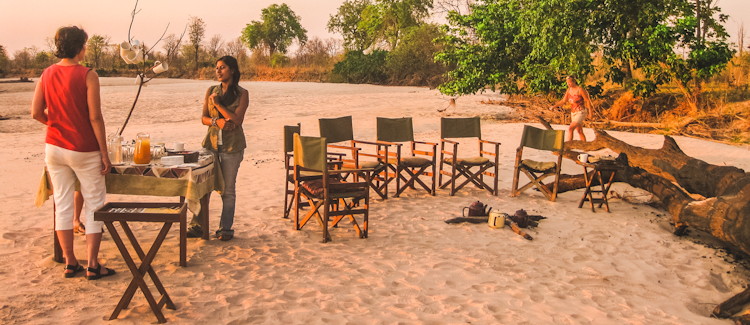
The South Luangwa Experience by Uyaphi.com
Chongwe River Suites
Chongwe River Suites, an emblem of exclusive serenity and adventurous spirit, nestled at the edge where the majestic Chongwe and Zambezi rivers converge. This unparalleled retreat offers an intimate gateway to one of Africa’s most stunning natural landscapes, the Lower Zambezi National Park.
Here at Chongwe Suites, every moment is an invitation to experience nature's grandeur—from the exhilarating encounters of wildlife safaris to the serene beauty of sunset cruises. Chongwe is more than a stay; it’s a vibrant tableau of nature, luxury, and adventure waiting to be discovered.
Anabezi Luxury Tented Camp
Each stay at Anabezi is designed to transcend the ordinary safari experience, allowing guests to revel in the splendour of their surroundings from the comfort of their private tented suite. With its commitment to excellence and attention to detail, Anabezi Luxury Tented Camp sets the benchmark for safari adventures that are as luxurious as they are authentic.
Anabezi Luxury Tented Camp is an exclusive safari retreat that offers the discerning traveller a fusion of unparalleled natural beauty, bespoke luxury, and a deep connection with the Lower Zambezi National Park.
Chongwe River Camp
Set on the edge of the Lower Zambezi National Park, Chongwe River Camp stands as a beacon of luxury and untouched natural beauty. Boasting eight exclusive tented suites, this luxury safari camp offers guests an intimate encounter with Africa's magnificent wildlife and serene landscapes.
Whether it's the thrill of an open safari vehicle drive, the tranquillity of bird watching, or the majesty of night safaris, Time + Tide Chongwe Camp is a place where nature's wonders unfold before your eyes, making every moment spent here a cherished memory.
Royal Zambezi Lodge
Nestled on the banks of the magnificent Zambezi River, the Lower Zambezi National Park lodge has been transformed into a breathtaking 5-star luxury haven. With its panoramic views of the sprawling river and the Mana Pools Reserve, teeming with wildlife and framed by stunning landscapes, this lodge offers an unparalleled experience.
From the sumptuous accommodation options to the exceptional service, every moment at the Royal Zambezi River Lodge is designed to surpass expectations, making it an undisputed jewel in the wilderness.
Chongwe River House
Discover the epitome of wilderness luxury at Chongwe River House, an enchanting haven nestled in the heart of Zambia's Lower Zambezi Valley and Escarpment. Crafted with an innovative design that harmonises with nature, this premier safari villa promises an exclusive escape into the wild.
Tailored for those who seek an intimate connection with nature without compromising on luxury, River House is your secluded sanctuary for an unforgettable Lower Zambezi National Park safari for a family or small group of friends.
Old Mondoro
Old Mondoro stands as a beacon for those yearning for an authentic safari, cradled in the vast expanses of the Lower Zambezi National Park. This unique luxury safari camp, perched on the serene banks of the Zambezi River, is a haven for wildlife enthusiasts, adventure seekers and nature lovers alike.
From the thrilling canoeing trips that offer up-close encounters with hippos and elephants to the serene sunset cruises and the pulsating excitement of guided night drives, Old Mondoro promises an African safari experience like no other.
Amanzi Camp
Amanzi Camp, a haven of exclusivity nestled in the stunning wilderness of the Lower Zambezi National Park, invites you to indulge in an extraordinary safari adventure. This secluded gem, with its intimate encounter with the African wilderness, is designed exclusively for those who seek a serene retreat, offering a unique and privileged experience.
From heart-pounding game drives to tranquil canoe excursions, Amanzi is a sanctuary where the thrill of the natural world is matched only by the quality of hospitality and service. Each activity is designed to ignite your sense of adventure and leave you with unforgettable memories.
Potato Bush Camp
Surrounded by the breathtaking landscape that Zambia is celebrated for, Potato Bush Camp guests are treated to a unique blend of adventure and tranquillity. From exhilarating game drives and night safaris to peaceful canoe trips all within the Lower Zambezi National Park, Potato Bush Camp offers an intimate connection with the wild.
The camp's commitment to providing a bespoke and unforgettable safari experience is evident in its meticulous attention to detail, from the gourmet dining experiences to the expertly guided tours.

